Declare for referendum in any unity meeting
[TamilNet, Saturday, 16 June 2012, 00:06 GMT]All groups of Eezham Tamils in the island and in the diaspora, seeking various shades of political solution beyond the present constitution of Sri Lanka, should meet together to present a joint stand of them, is an opinion currently pressurising all of them, mainly the TNA, both the factions of the TGTE, GTF and the Country Councils in various Western countries. While it is well known that the pressure ultimately comes from dubious international crisis management forces that are keen in diffusing the national question of Eezham Tamils through ‘tangent’ approaches, Eezham Tamil political groups could make use of the move to solidly present certain fundamentals to the edification of the so-called international community and India. The most fundamental, democratic and irrefutable stand is to demand for getting an answer from the concerned people through a referendum.
TamilNet Editorial Board
Currently the canvassing point of the brokers of crisis management is
telling the Tamil groups to begin from ‘accepting’ the Provincial
Council (a truncated version of the 13th Amendment) and to ‘build up’
from it. It is ‘too late’ to begin from anything else, since the Provincial Council (PC) is the model that is agreed upon and confirmed between India and the USA, the brokers threaten.
Even the brokers having ‘expertise’ on Sri Lanka confess that when they themselves have not fathomed the problems of the PC model how to expect the policy makers in the establishments to revise their opinion.
The new US envoy to Colombo comes with holding PC in one hand and bogus demilitarisation on the other.
Signals that come from the North and East tell us beyond doubt that Sinhala militarisation aims permanency with the blessings of India and the US. There will be only a new interpretation to what is ‘demilitarisation’, i.e., permanent bases with which Tamils have to see the heaven of ‘reconciliation’.
Occupying Sinhala commander Hathurusinghe has already specified that demilitarisation doesn’t mean closure of bases. He will not say that and the occupying military would not invest so much on permanent bases, if the international signals, coming especially from the US and India were not favourable.
The on-going struggle of civic bodies in the North against SL military appropriations and what is happening in the East even when there is an elected PC are clear evidences exhibiting the futility of the model, which will consume the entire energy of Eezham Tamils only on day to day struggles and on nothing else. Perhaps that is what the larger forces want.
If the New Delhi wallahs really do not understand the unworkability of the PC model, they could very well ask Varatharaja Perumal.
The US and India are yet to open mouth on colonisation and Sinhalicisation, but the crisis brokers have now taken up the colonisation issue as their own agenda to prolong on it and to hoodwink attention away from the right model of political solution to resolve the issue and other fundamental issues.
The deliberations will go on for some more years to give enough time to the genocidal agent state in Colombo to fulfil the agenda, when the same crisis managers or their successors would come and tell that it is too late for any other solution.
Sinhala colonisation in the North and East is an issue that begins from the days of the All-Sinhala cabinet of the Donoughmore constitution of pre-independence days.
It was an issue discussed and solutions were agreed upon in the Bandaranayake–Chelvanayakam pact of 1957 and in the Dudley Senanayake–Chelvanayakam pact of 1965, both of which were ditched by Colombo. Therefore, all Sinhala colonisations in the North and East that took place after 1956 were illegal, was the position of pre-militant Tamil leadership.
Only the Tamil militancy was able to arrest the process for three decades, but genocidal Colombo is now given with a free licence to carryout colonisation in full swing.
It is of utmost importance that the current Tamil leadership in the island and in the diaspora should now take a united policy decision on the benchmark to be adopted on the legality and illegality of settlements in the North and East, and declare that policy to the world for future deliberations.
In this respect, India has set an example in resolving the Assam crisis in the late 1970s.
For a long time now, cautious political analysts among Tamils have repeatedly been telling their politicians to trust the people first and build their politics based on people. A struggle is neither confined to negotiations nor to simulating demonstrations to suit the agenda of the very forces against which the struggle has to be waged.
Even in negotiation one has to be careful about with whom one negotiate in a democratic struggle.
We will be contributing further to the already criminalised world system and to our own plight, by not addressing the peoples and their democratically elected representatives in the powers of our concern but by choosing brokers among their intelligence operatives, ‘crisis managing’ NGOs, media persons and swamijis who are responsible to no one. If our politicians have to learn anything from the past this is the foremost.
We will be sending a better message to the system that oppresses us, by first boycotting the dubious brokers who are not transparently responsible to any government or people, than by boycotting the products that come from Sri Lanka.
But unfortunately even some of the so-called Marxists among Eezham Tamils, who shun the struggling shades of Tamil nationalist polity as ‘sectarian,’ think that it is a mainstream move to legitimise the brokers of imperialism by sharing stages with them in forums.
On the contrary, the leftist political parties in Europe have a better understanding of the situation and on the futility of the moves by the Establishments and their brokers.
If the existing leaderships and leadership claimants among Eezham Tamils think that they are not sufficiently evolved or polarised into a position of commanding the trust of the people needed by the times, and they have to harp on negotiations with the powers to get the political space, it is high time that they use the opportunity to come together and honestly place the responsibility of setting the bearing with the people.
The main groups, the TNA, both the factions of TGTE, GTF and the Country Councils – all have constitutions that set the shade of their politics. Leaving the GTF and some Country Councils, all the others claim direct mandate of the people, from constituencies of Eezham Tamils in the island and in the diaspora.
What has to be specified by them is that a joint meeting doesn't mean the parties compromising with their constitutions or mandate.
As they all have varying shades of political fundamentals as solutions, problems will crop in only when they are forced to agree upon a model imposed from the above or ‘engineered’ to come amidst them.
A situation may come in that Tamils would reject all the present leaderships and leadership claimants, if they go against the constitutions and mandate. In fact, if the present leadership, leadership claimants and individuals operating behind the scene fail, Tamils have to be prepared for a spontaneous uprising to bring in the next line of leadership.
But the current political activists who have come forward to serve the Eezham Tamils at a critical time could avoid that embarrassing uprising.
A safer avenue that would not contradict the constitution and mandate of any of the parties, and a democratic claim that cannot be theoretically or righteously rejected by anyone other than those who have conked out appetite, is the Tamil parties jointly declaring for a referendum to know the wish of the concerned people, and asking the world to facilitate such a referendum.
While India and the so-called IC continuously vilify the Tamils and the diaspora, ask them to drop this and that, and try to project their own agenda as the opinion of Tamils, the Tamil groups have never asked the IC or India to tell the SL government to drop at least the 6th Amendment so that the Tamils could freely tell their opinion.
In recent days, The Hindu highlights 6th Amendment related cases affecting the Tamil leadership in the island, but in a negative way encouraging submission by Tamil leaders. TNA leadership should have been the first in demanding the abolishment of the 6th Amendment rather than meekly defending it and providing fodder to deviatory elements in India.
Whenever the Eezham Tamil parties seeking solutions beyond the present constitution of Sri Lanka are pressurised to meet together, it is advisable on their part to include political representation of that shade from Tamil Nadu too in such meetings.
A major political party of Tamil Nadu, the DMK, and a major All-India political party, the Communist Party of India, have already come out with calls for referendum.
There are many other parties in Tamil Nadu who have traditionally supported the call for the independence of Eezham Tamils. The ruling AIADMK has taken a major legislative step on war crimes. What is needed is a consolidated appeal to world humanity to the edification of the agenda of the powers.
Considering the nature and level of Indian involvement in the island, and as everybody including the Western brokers often pass the ball into India’s court on any model of political solution, there is nothing wrong in Eezham Tamils strengthening themselves by including likeminded shade of Tamil Nadu political representation in their political deliberations.
Tamil Nadu is definitely a stakeholder and unless the Eezham Tamils in the island, in the diaspora and Tamils in Tamil Nadu join together in any struggle, the current regional and international challenges cannot be faced.
The arrangement to include political representation from Tamil Nadu in unity meetings is a safety mechanism against any intimidation coming from Washington or New Delhi.
Eezham Tamil political organisations whether in the island or in the diaspora should also consider the fact that a huge number of Eezham Tamils currently living in India as refugees or as self-supporting residents have lost all political voice in the current deliberations that are confined only to the island and to the diaspora in the West.
This machination of New Delhi in silencing a large section of Eezham Tamil refugees and the West’s tactics of isolating the rest in the diaspora to reduce the Eezham Tamils into a microscopic formation in order to deny solutions deserved by a nation, have to be countered in some way.
The referendum model presented herewith aims at kindling further discussions. We look forward to opinion of our readers in correcting or evolving the views [TamilNet Editorial Board]
Considering the articulating pressures and claims coming from India and the so-called International Community, and considering the nature of the Eezham Tamil political groups and their mandate in the island and in the diaspora, a probable model for the referendum could have three options:
- Independence of Tamil Eelam
- Unitary Sri Lanka
- Exploring any other alternative
The participants of the referendum should be people of the Northern and Eastern provinces – people born there, or their descendants of any generation born and living in any part of the world.
People “born there” may be defined by some benchmark, as prior to 1948 (independence of Ceylon)/ prior to 1956 (B-C pact)/ prior to 1965 (D-C pact)/ prior to 1972 (the republic rejected by Eezham Tamils) or as prior to 1977 (when the Tamils in the north and east mandated for Tamil Eelam based on Vaddukkoaddai Resolution).
The US and India should jointly facilitate conditions to conduct a UN presided referendum. The other powers may be left out, as they never cared for entering into any political interaction with Eezham Tamils.
The SL military has to be completely removed or strictly put under barracks during the interim period. Paramilitary groups have to be completely disarmed.
A situation has to be created for the free travel and interaction of the diaspora with the Tamils in the island. Palaali and Trincomalee airports have to be opened for this purpose.
A UN presided committee of stakeholders and a police recruited by it should take charge of administration, civil security and the process of referendum.
One representative each from the following stakeholders may constitute the committee, presided by a UN representative.
- Co-Chair countries
- Government of India
- Government of Sri Lanka
- Government of Tamil Nadu
- SLMM countries
- Tamil political parties in the island contested in the North and East
- Muslim political parties contested in the North and East
- Colombo and Up-country Tamil political parties
(as they are affected by the decisions) - Sinhalese of the North and East
(UN should supervise electing representation) - Churches of the North and East
- Representation of the LTTE
(from the imprisoned and released cadres, supervised by the UN) - Representation of other militant groups that participated at Thimbhu or in any other recognized talks
(electing representation supervised by the UN) - Politically mandated diaspora Tamil organisations
- Representation of registered refugees in India
(electing representation supervised by the UN)
The call for referendum is suggested in lines with the Tamil Sovereignty Cognition and in lines with the Right to Self-Determination of a nation.
The three-option model, which is different from the re-mandate of the Vaddukkoaddai Resolution, is suggested here to test the validity of the adamant claims of India and the so-called International Community.
As far as the people in the island and the diaspora are concerned, the mandate of Vaddukkoaddai in the 1977 and the re-mandate of it in 2009-2010 are the most valid ones.
There was no general election free of legal constrains in expressing the independence option of Tamils in the island after 1977. Therefore the 1977 mandate still holds valid.
The Vaddukkoaddai re-mandate in the free diaspora polled almost an equivalent number of votes polled by the TNA in the last parliamentary elections in island, in which under gagged conditions the TNA said that they had dropped Tamil Eelam.
The question in the island can never be proved or resolved without the diaspora, which is part of the nation.
If the IC and India are genuine let them try the opinion of the concerned people in a free and fair referendum. Let them try the democratic validity of even their shade of opinion.
In the meantime, both the TNA and the political organisations in the diaspora should get cues from the civil society movement in the North and East.
The success of the civil society movement in captivating the minds of the masses is that it has articulated their aspirations better, including meeting the challenges of India and the so-called international community. Even the free diaspora failed to achieve what the civil society has achieved under gagged conditions in the island.
Another cue the TNA and diaspora organisations should get from the civil society movement is achieving the trust of the people in bringing in unity and democratic ground realities.
Never trust that the ‘devolution of powers’ promised by the establishments would satisfy our aspirations or that ‘power’ would be served on a platter to whoever prove their ability in ‘collaboration’.
Power comes from the people.
Building the nation on the ground and in the hearts of the people is of priority than making empty public stands.
People are prepared, but the leadership and leadership claimants are not. They think that chauvinism of state in Colombo alone would bring in the need for changes.
Convincing the people in the North and East about a secular, alternative state in the island should precede the referendum.
TNA and the diaspora organisations have a duty in this respect in engaging especially with the Muslim Tamils.
Colombo at the moment tries to deal with Tamil collaborators and Muslims in the East separately.
The local issue between Tamils and Muslims in the East was always an Achilles Heel in the nation formation in the North and East, and it is high time the Tamil leadership in the island and in the diaspora resolve it.
While any unity meeting of Tamil parties should be based on many priorities of a fundamental nature, serving the agenda of powers and crisis managers should never be allowed to hijack such meetings.
Related Articles:
08.06.12 US commander, Indian defence minister assure military aid to..
 இமெயில்
இமெயில் பிரதி
பிரதி கற்றுக்
கொண்ட பாடங்கள் மற்றும் நல்லிணக்க ஆணைக்குழுவின் பரிந்துரைகளுக்கு அமைய
வடக்கு கிழக்கைச் சேர்ந்த மக்களுக்கு தேசிய மொழிகள் மற்றும் பயிற்சி
நிறுவகத்தினால் சிங்கள மொழி கற்பபிக்கப்பட உள்ளதாக தெரிவிக்கப்பட்டுள்ளது.
கற்றுக்
கொண்ட பாடங்கள் மற்றும் நல்லிணக்க ஆணைக்குழுவின் பரிந்துரைகளுக்கு அமைய
வடக்கு கிழக்கைச் சேர்ந்த மக்களுக்கு தேசிய மொழிகள் மற்றும் பயிற்சி
நிறுவகத்தினால் சிங்கள மொழி கற்பபிக்கப்பட உள்ளதாக தெரிவிக்கப்பட்டுள்ளது.






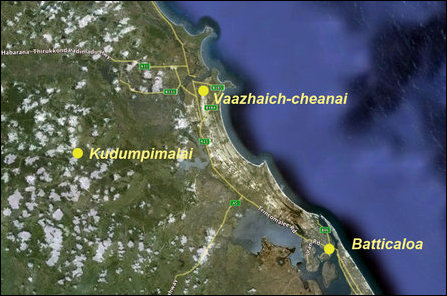

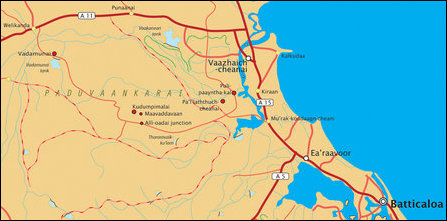
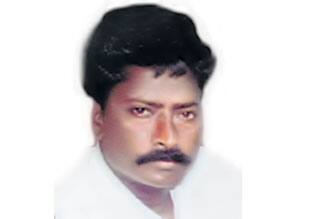








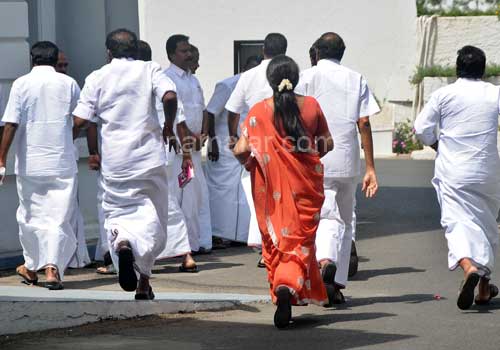





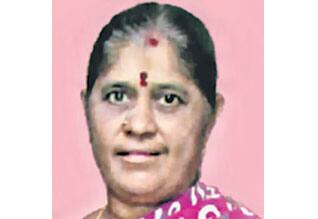
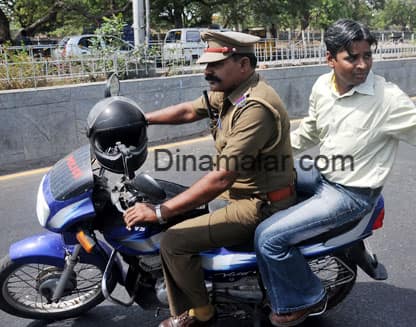





6/14/2012 8:16:00 PM